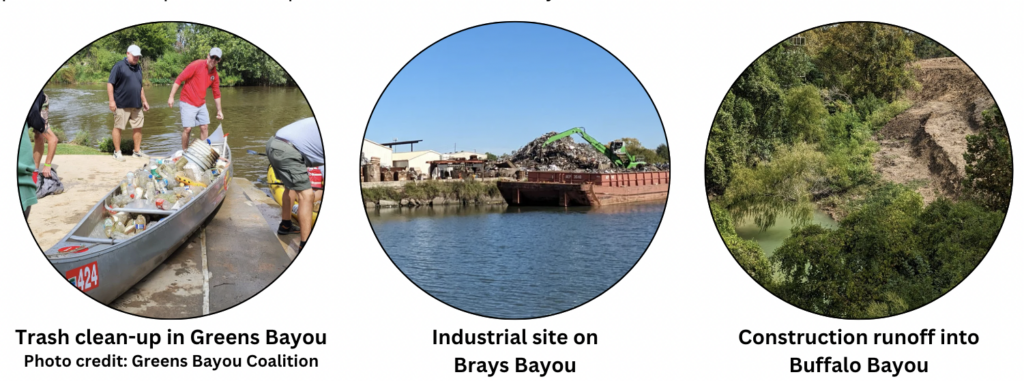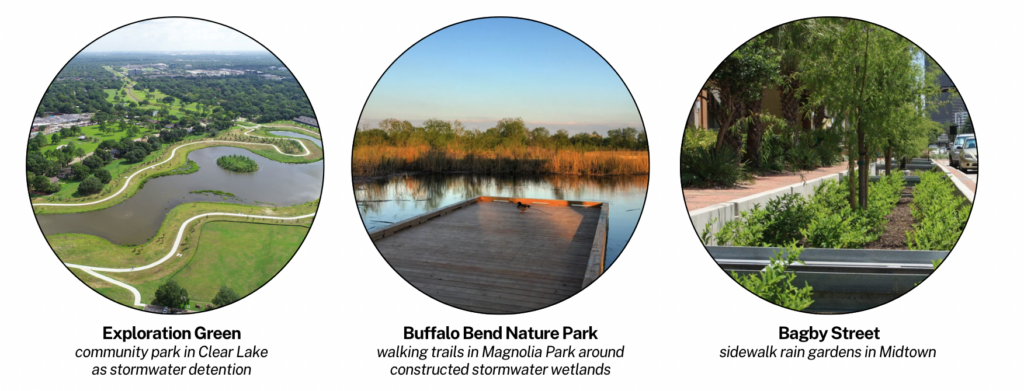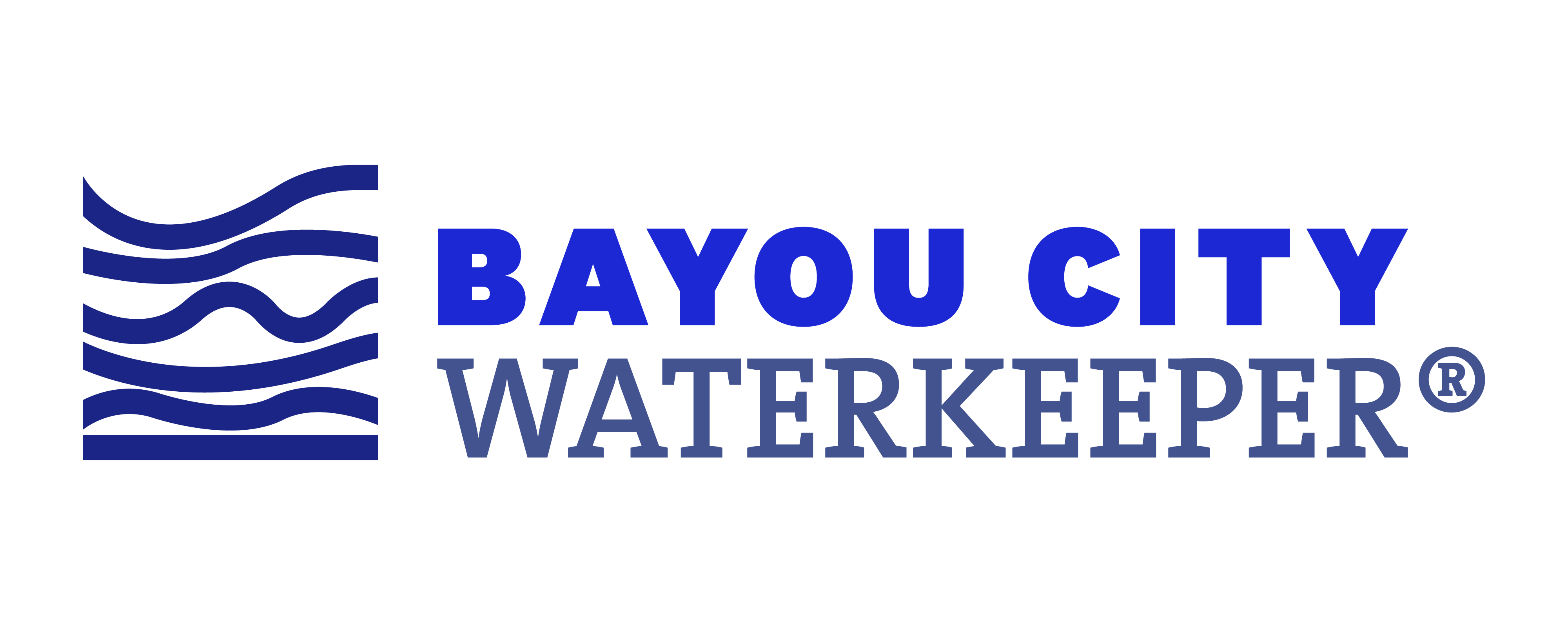
UPDATE 2/15/24: Today, with the support of 13 organizational and community partners and 133 petition signers, we sent a letter to the Texas Commission on Environmental Quality and U.S. Environmental Protection Agency, Region 6, asking for a major amendment of the MS4 permit shared by the City of Houston, Harris County, and Harris County Flood Control District. Read the letter and add your support to the petition.
What does “MS4” mean and why does this matter?
Municipal Separate Storm Sewer Systems (MS4) is a program under the federal Clean Water Act that governs stormwater runoff in urban areas across the United States, including the greater Houston region. The term “storm sewer systems” within the acronym “MS4” encompasses the networks of drains and pipes owned by public entities that are responsible for collecting and transporting stormwater, such as rainwater that flows over streets, parking lots, and other surfaces, collecting contaminants and debris along the way. In cities like Houston with separate systems for managing stormwater and sanitary sewage, MS4s discharge stormwater directly into local water bodies, without any treatment. This means that everything stormwater picks up as it travels—including gasoline, motor oil, trash, pesticides, fertilizers, pet waste, and sewage from faulty septic systems or sanitary sewer overflows— gets carried directly into our bayous.
The MS4 program is intended to address and reduce these sources of pollution, and it does this through a permitting process. Permit-holders must develop stormwater management programs, set goals for reducing pollutants, and adopt best management practices for minimizing runoffs and contamination, to control pollutant discharges and safeguard water quality.
Tell me more about the MS4 permit in Harris County and City of Houston.
Since 1998, the city of Houston, Harris County, and Harris County Flood Control District have jointly held an MS4 permit, covering stormwater management across this region. The permit was last issued in 2009, and rather than update the permit when it expired in 2014 and 2019, the Texas Commission on Environmental Quality “administratively continued” the permit without substantial revisions. This has left our region with a weak permit, designed for a Houston and Harris County of 15 years ago, without real enforceable provisions. This inadequacy has led to: trash clogging waterways, impaired water quality, and hidden risks during storms. Updating the permit’s vague and minimal requirements will strengthen the city and county’s stormwater management programs, reduce pollution into our bayous, and improve the health of our communities.
How does this affect me?
Our region’s MS4 permit will be up for renewal in 2024. This permit renewal period presents an opportunity to significantly reduce trash and industrial pollution burdening local waterways—building on other community wins in recent years that have led the City of Houston to address illegal dumping, maintain open-ditch drains, invest in sanitary sewer infrastructure; and Harris County to invest in flood infrastructure. The renewal process offers a chance to center community priorities and energize new partnerships between the City, County, and the Flood Control District, focused on addressing industrial pollution and illegal trash dumping, education programs, drainage upgrades, and sewer system improvements, while increasing investment in green infrastructure.

This is an environmental justice issue. Low-income communities and communities of color are disproportionately impacted by flooding, pollution, and lack of access to green spaces. The MS4 renewal process should prioritize improvements in historically underserved areas.
What is green stormwater infrastructure?
Green stormwater infrastructure (GSI) integrates natural landscapes and processes to manage stormwater runoff. GSI is also referred to as low-impact development or nature-based solutions. While we often think of green infrastructure for flood benefits, it also helps mitigate environmental impact of stormwater through sustainable practices—such as permeable pavements, bio-swales, urban forestry, and wetlands restoration. GSI does this while providing multiple other benefits: it also can create recreational space and wildlife habitat, improve water and air quality, capture carbon, reduce urban heat, and minimize erosion.
How could an updated MS4 permit encourage its use?
Other regions have used their MS4 permits to expand investment in green stormwater infrastructure. Green stormwater infrastructure aims to reduce pollution and improve water quality while naturally mitigating flood risks. Green infrastructure may include rain gardens and bio-swales, constructed or restored wetlands, green roofs, and urban forestry, which help mitigate runoff and filter pollution before reaching storm drains, aligning both with the MS4 permit’s purpose and community priorities.
The upcoming MS4 permit renewal will allow Houston and Harris County to institutionalize green infrastructure as local policy and use their permit programs to increase investment in green infrastructure across our region create greater investment in green infrastructure across our region. The success of green infrastructure programs may lead it from an aspiring city program to an established policy standard.
What are some examples of green infrastructure locally that have worked?
- Exploration Green, located by Johnson Space Center Houston, transformed a former golf course into a park with stormwater detention capacity that prevented homes from flooding during Hurricane Harvey
- Yolanda Black Navarro Buffalo Bend Nature Park, a 10-acre green space in Houston’s Magnolia Park with three constructed wetland ponds and a solar-powered cistern for water management
- Bagby Street Reconstruction Project integrating green infrastructure into sidewalks along ten blocks of Midtown Houston

Learn more and take action
- Sign and share our petition calling for an overhaul to Houston and Harris County’s MS4 permit
- Share our two-pager capturing the information above (en español)
- Read our letter to the Texas Commission on Environmental Quality and US Environmental Protection Agency, Region 6
- Watch our community meeting featuring former Harris County Engineer John Blount: What is the MS4? (Or how can we address trash and industrial pollution and bring more nature back to our communities?) (code: *EcNP4ib)
- Report water pollution that you are seeing in your neighborhood.
- Join Harris County’s Community Flood Resilience Task Force and call for equitable investment in nature-based flood infrastructure. Email CFRTF@hcfcd.hctx.net to learn more.
- Learn from the EPA’s Compendium on MS4 Permitting Approaches (Green Infrastructure)
- Visit BCWK’s Justice in the Sewers hub at http://bit.ly/sewerhub.
